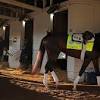Brazil's presidential election heads to a runoff between Lula and Bolsonaro

SÃO PAULO, Brazil – Luiz Inácio Lula da Silva, a left-wing former president, finished in first place Sunday in Brazil's presidential election, but failed to secure enough votes for an outright victory and will face right-wing incumbent Jair Bolsonaro in an Oct. 30 run-off.
The race was close despite preelection polls showing that da Silva, better known as Lula in Brazil, had a double-digit lead. Da Silva was trailing for much of the night, before finally closing the gap and winning with 47.9% of the vote. With 43.6% of the votes, President Bolsonaro finished second in the 11-candidate race.
After a turbulent, sometimes violent campaign during which Brazil's democracy seemed in jeopardy, Sunday's voting was peaceful. Bolsonaro, a brazilian politician who has praised the military dictatorship that ruled Brazil in the past, repeatedly challenged the legitimacy and questioned his opinion poll numbers as the election approached.
Julia Sottili, who works as a museum worker, said that Lula represents democracy. She voted for da Silva due to Bolsonaro’s authoritarian tendencies. "Lula wants people to live better lives and end hunger. He is very concerned about human rights.
The campaign will continue for the next four week.
Michael Dantas / AFP via Getty Images
/
AFP via Getty Images
Preelection polls showed that da Silva was within striking distance of winning in the first round of the presidency by securing more votes than half. Brazil is now facing four weeks of intense campaigning.
The result was still a sort of vindication for da Silva who became a hero to many Brazilians in his two terms as president from 2003 to 2010, when a commodities-fueled boom helped lift millions of people out of poverty.
After he left office, he was caught up in a wide-ranging corruption scheme that sent him to prison for over a year. His political career looked over. Then, in a stunning turnaround, he was released on a technicality in 2019 and launched his campaign for the presidency — the sixth time he has run for the office.
Bolsonaro's second place finish on Sunday was, however, a sobering result. It was a sad result for the president whose erratic behavior & policy decisions cost him support.

Fred Magno / Getty Images
/
Getty Images
Bolsonaro was elected to power by a coalition of evangelical Christians, gunowners, and other conservatives. They were attracted to his promise to uphold traditional family values. They were also disgusted at the corruption scandals surrounding da Silva and his left-wing Workers Party.
Bolsonaro, now 67, has had a difficult four years in office. Bolsonaro downplayed the COVID-19 epidemic and Brazil was the country with the second-highest COVID death rate after the U.S. He is dealing with a stagnant economic situation, high inflation, unemployment, and rising poverty.
Bolsonaro spent months questioning Brazil's electoral integrity, urging the military to count the ballots and hinting that he might not resign even if he loses. He posted a video of former President Donald Trump on Twitter, urging people to vote for his candidacy.
All of this gave da Silva, now 76, an opportunity to win. He is also a survivor from throat cancer. On the campaign trail he promised a return to the economic good times of his first two terms and portrayed himself as the man who could salvage Brazil's democracy — by beating Bolsonaro.
Copyright 2022 NPR. Visit https://www.npr.org to see more.


 United States
United States Argentina
Argentina  Australia
Australia  Austria
Austria  Brazil
Brazil  Canada
Canada  Chile
Chile  Czechia
Czechia  France
France  Germany
Germany  Greece
Greece  Italy
Italy  Mexico
Mexico  New Zealand
New Zealand  Nigeria
Nigeria  Norway
Norway  Poland
Poland  Portugal
Portugal  Sweden
Sweden  Switzerland
Switzerland  United Kingdom
United Kingdom 





























